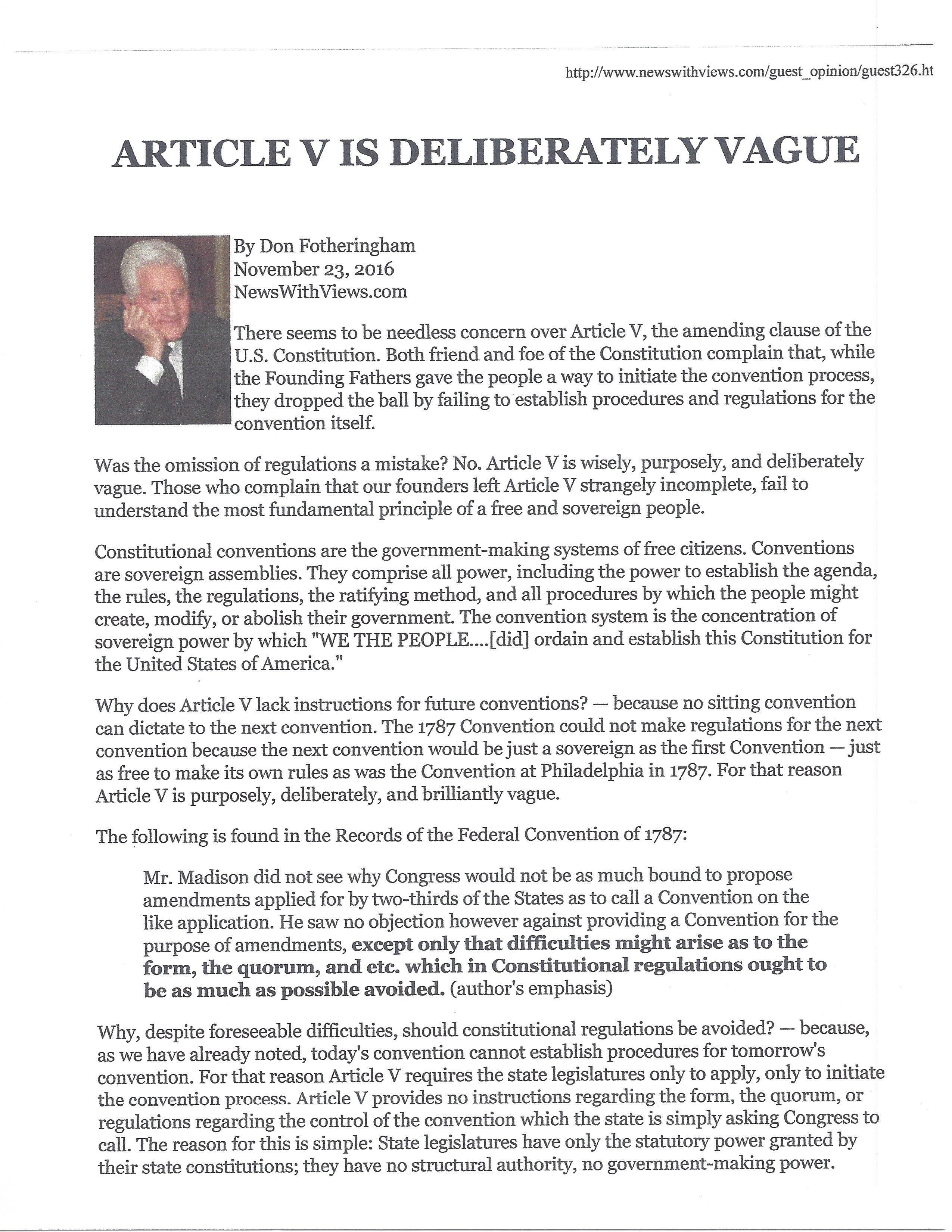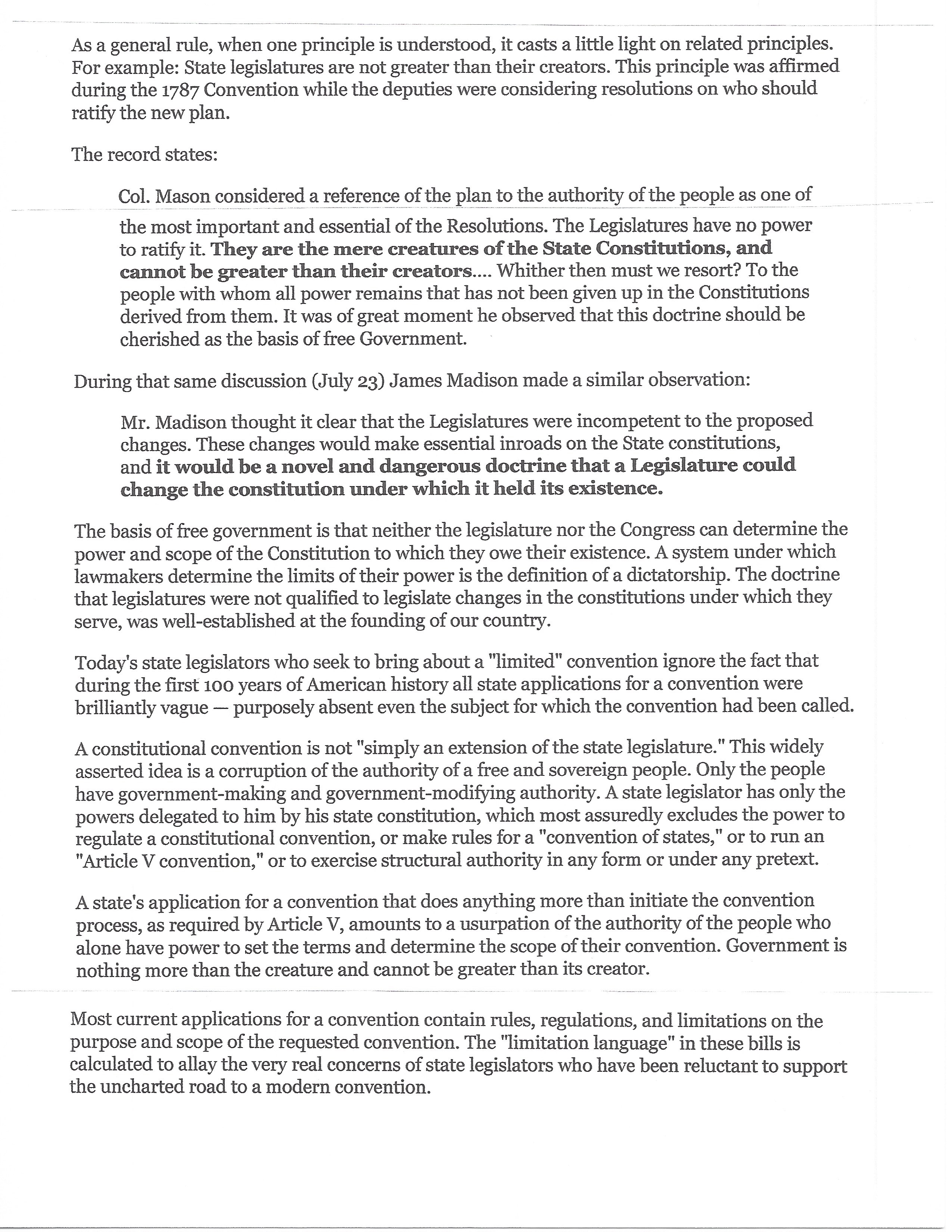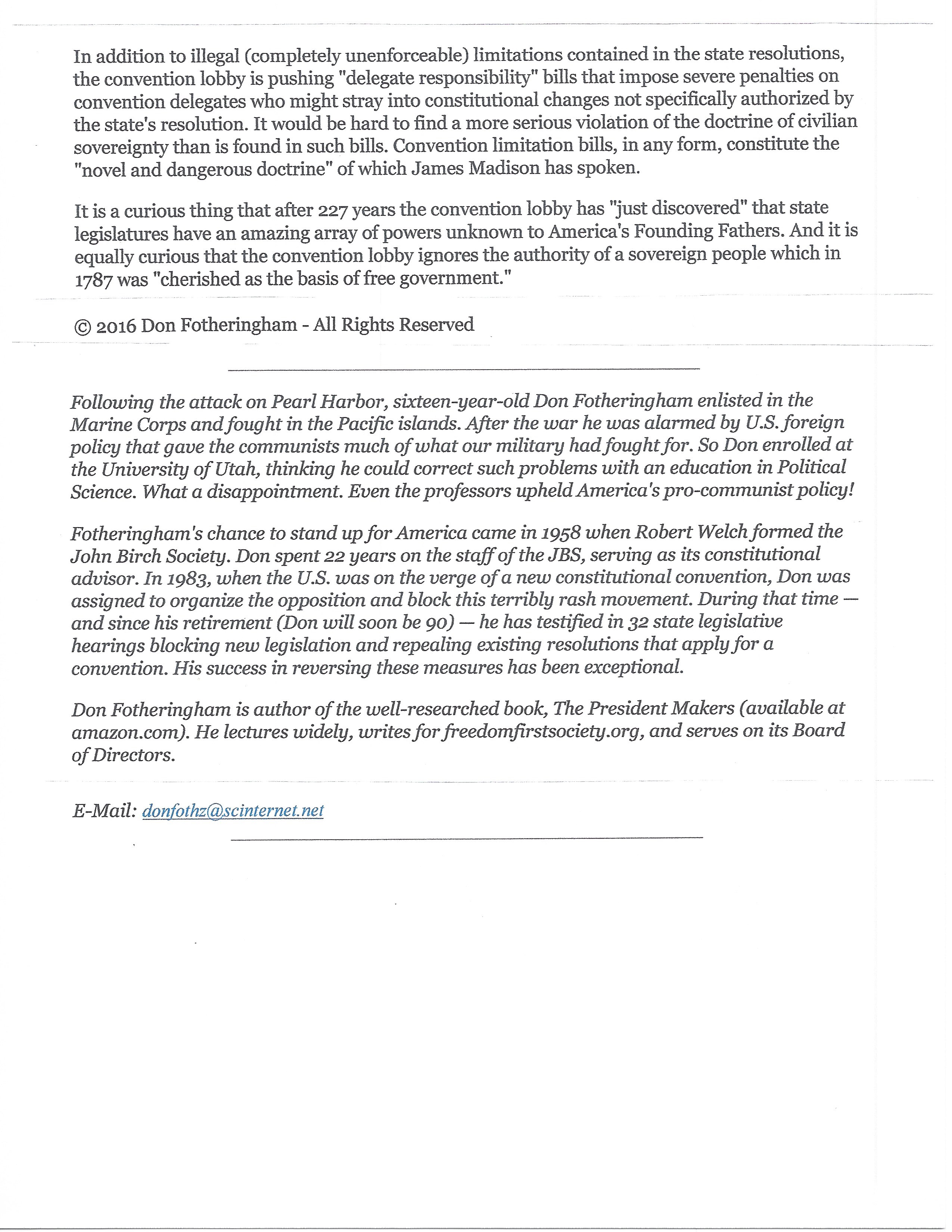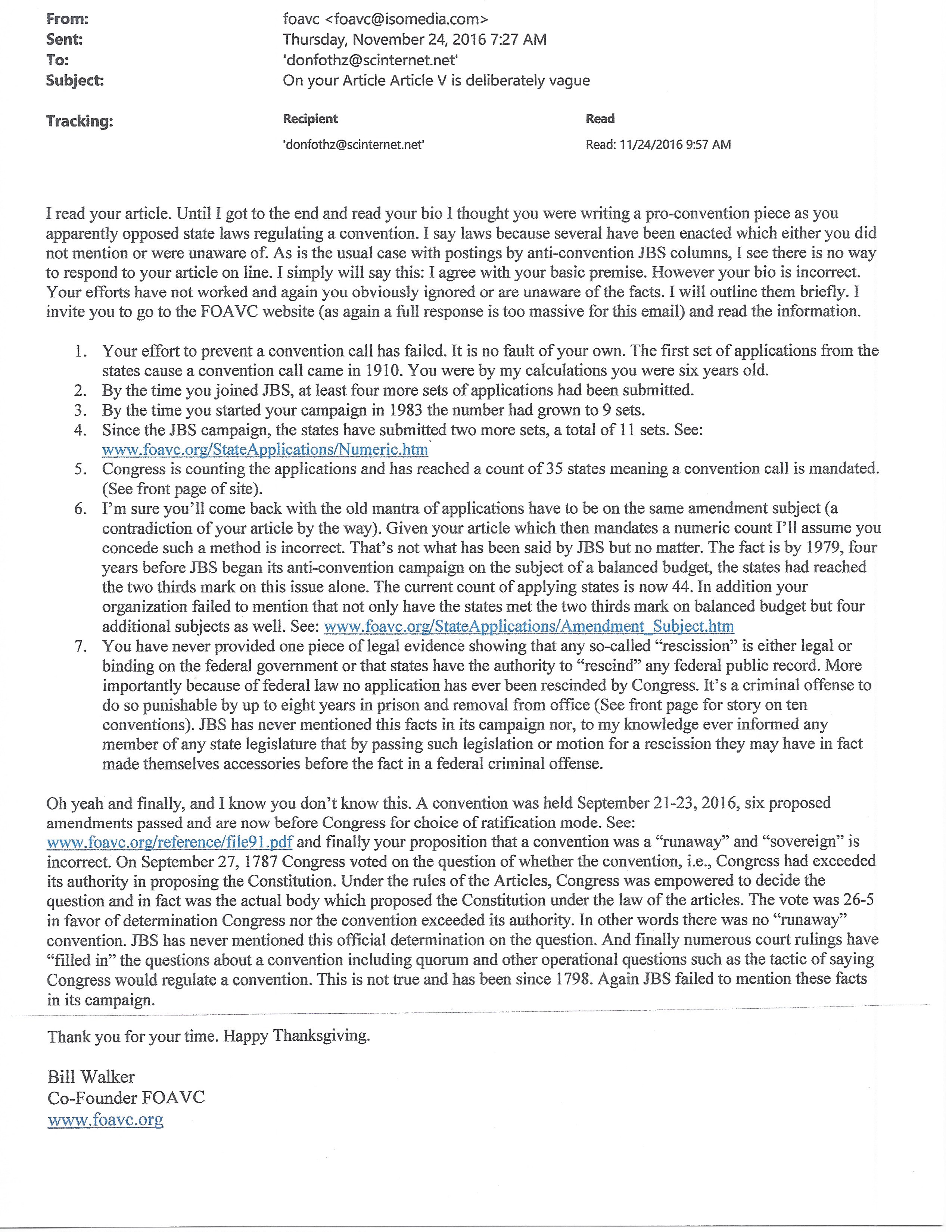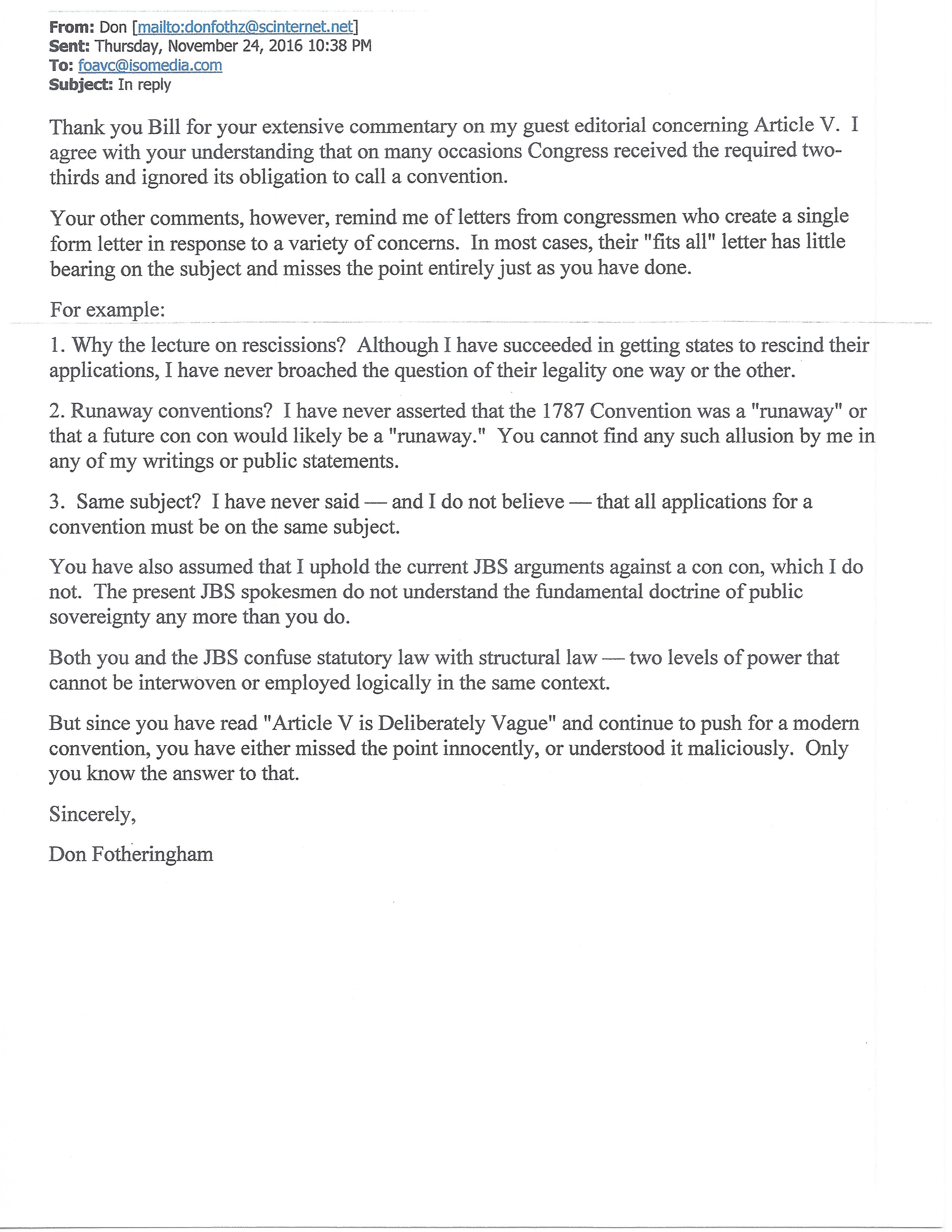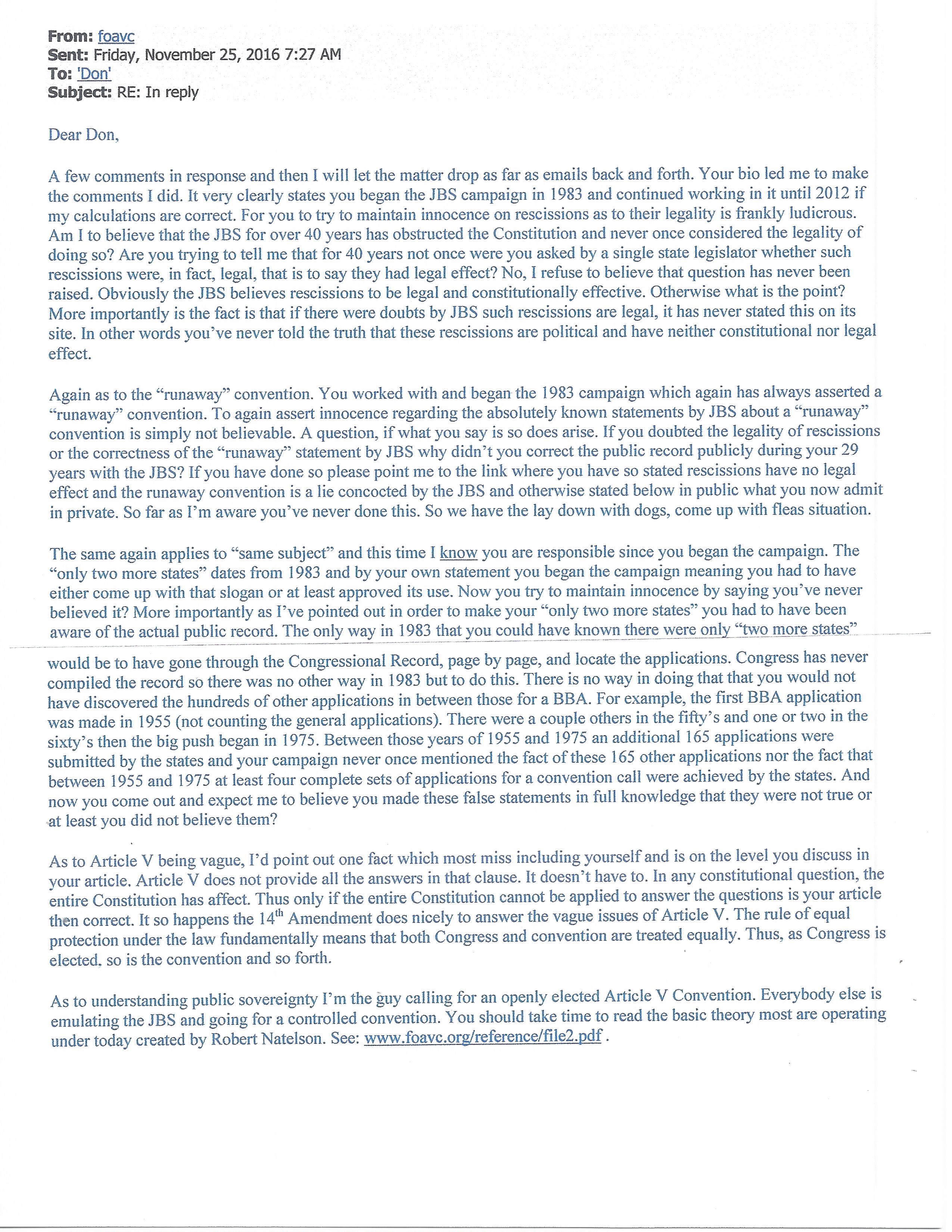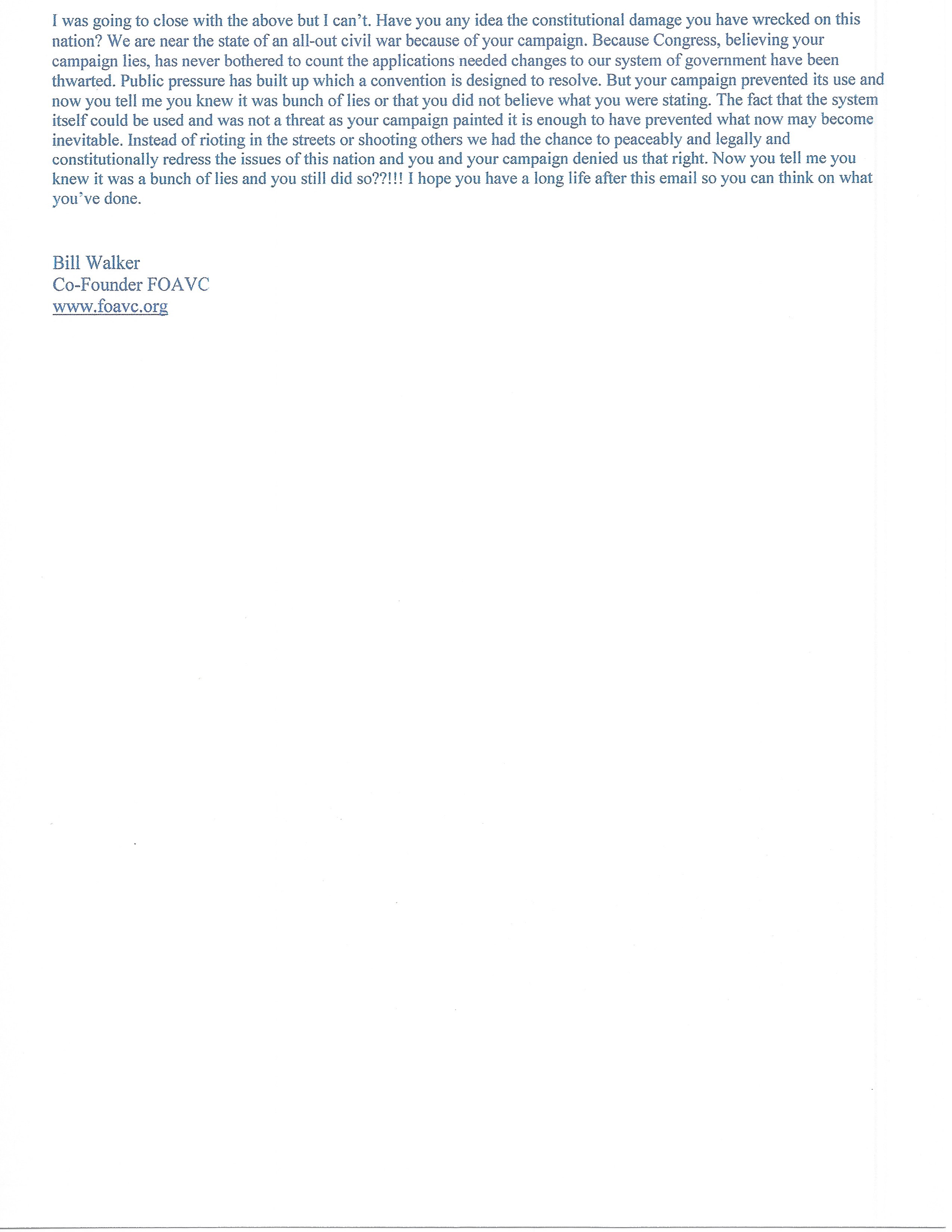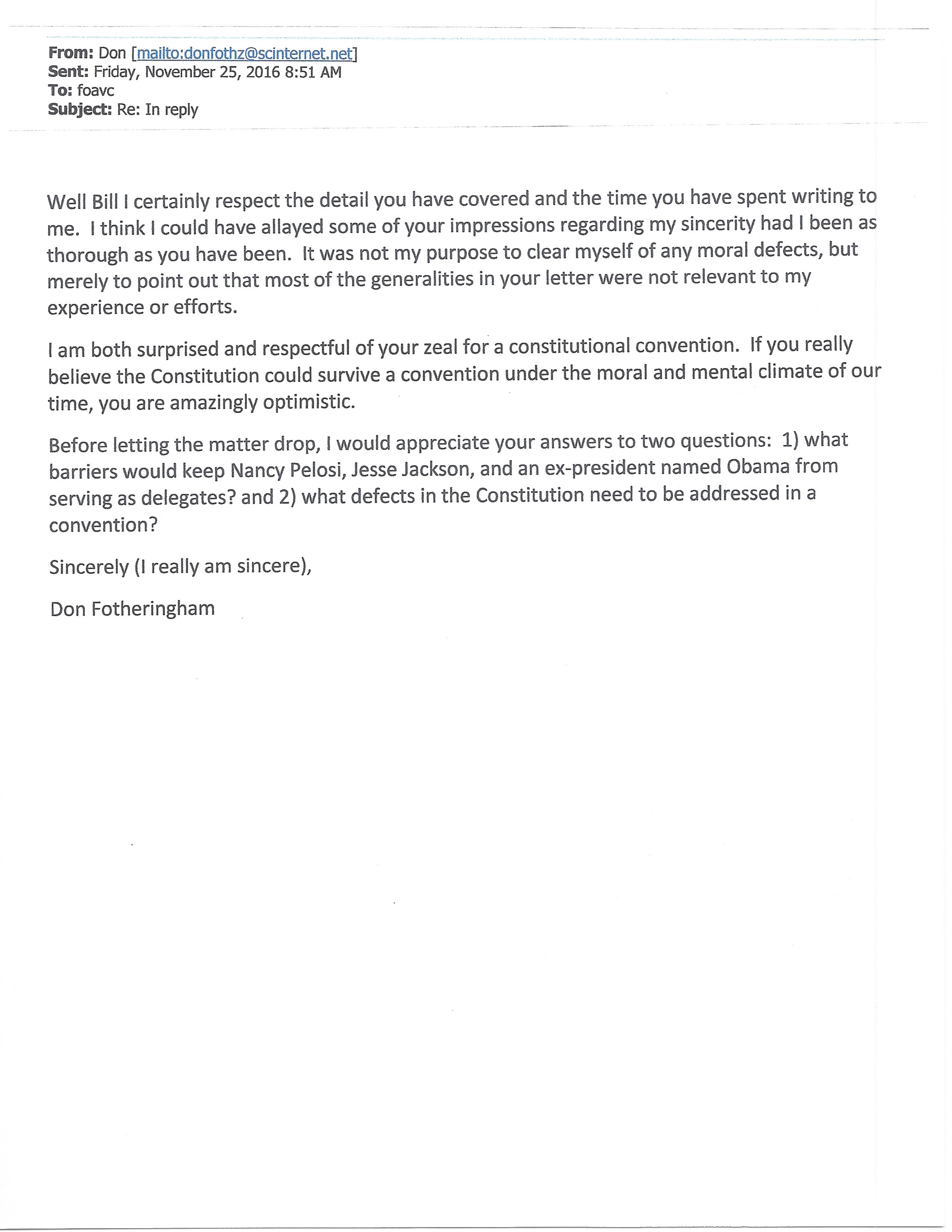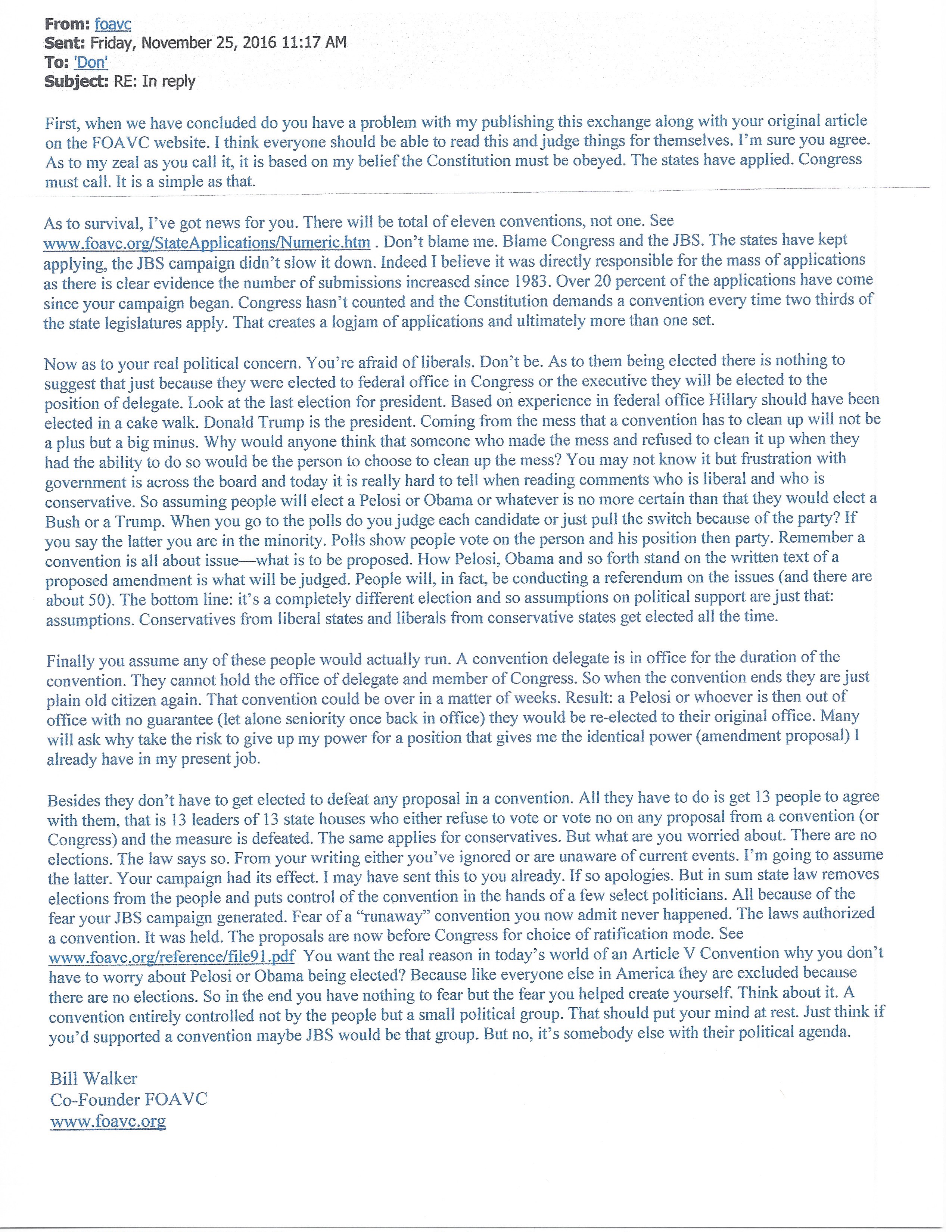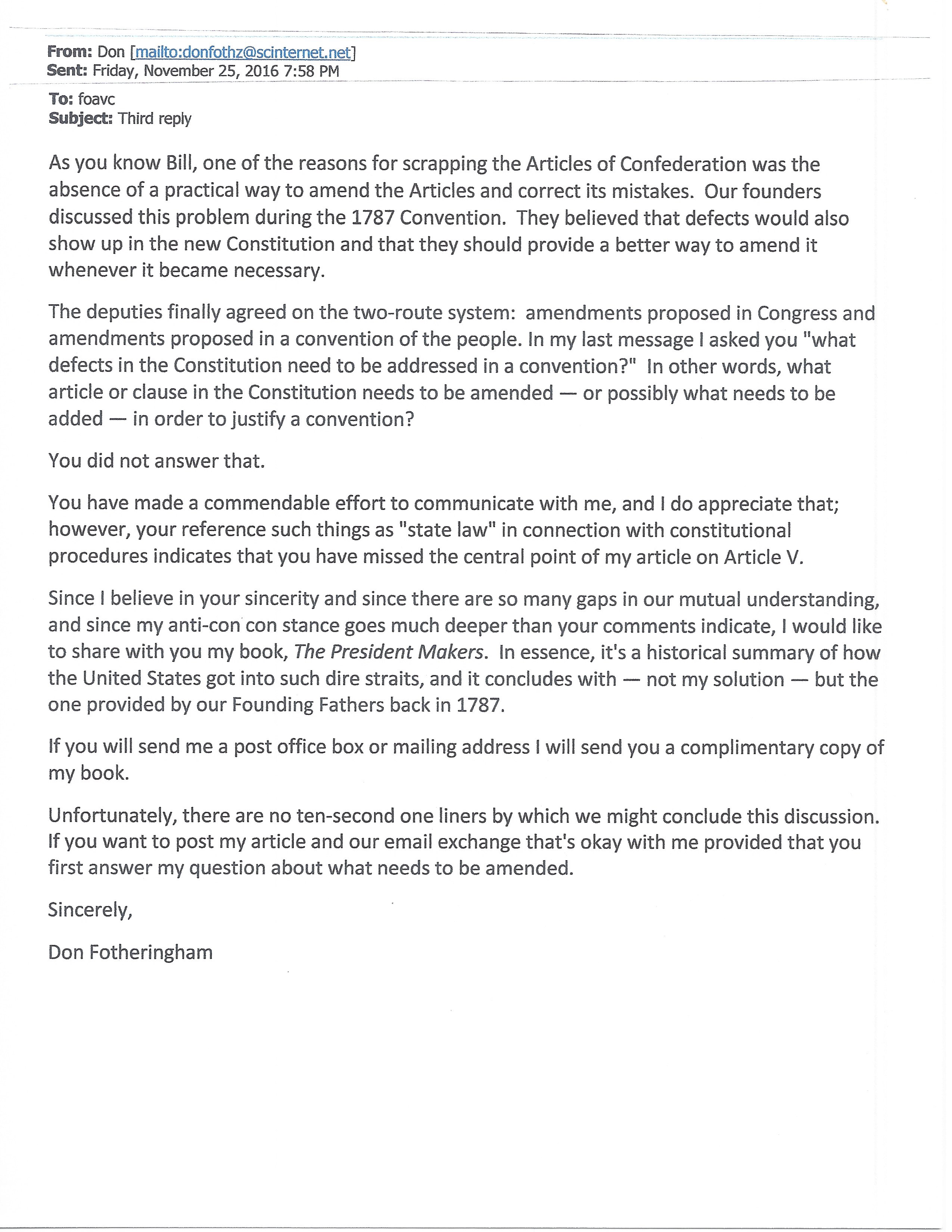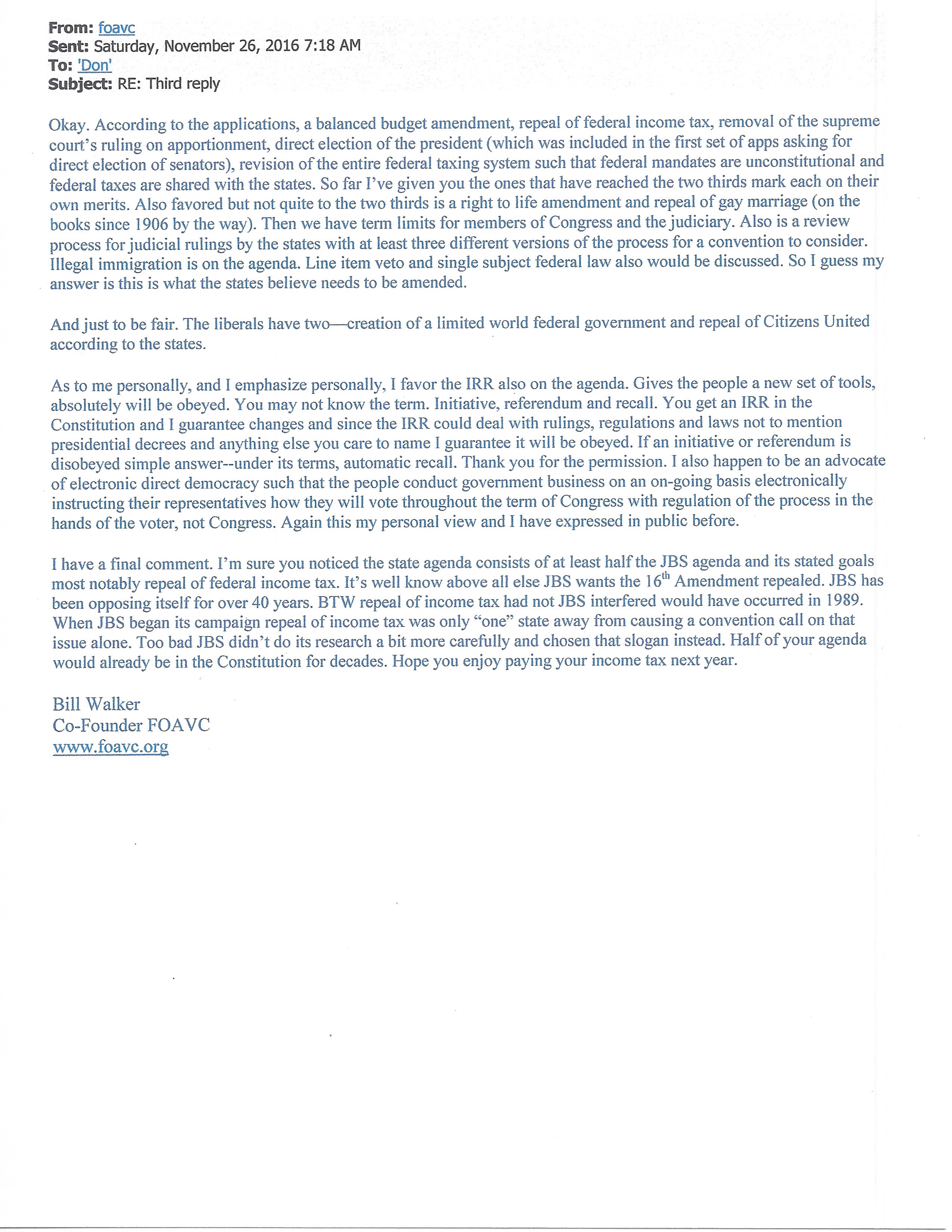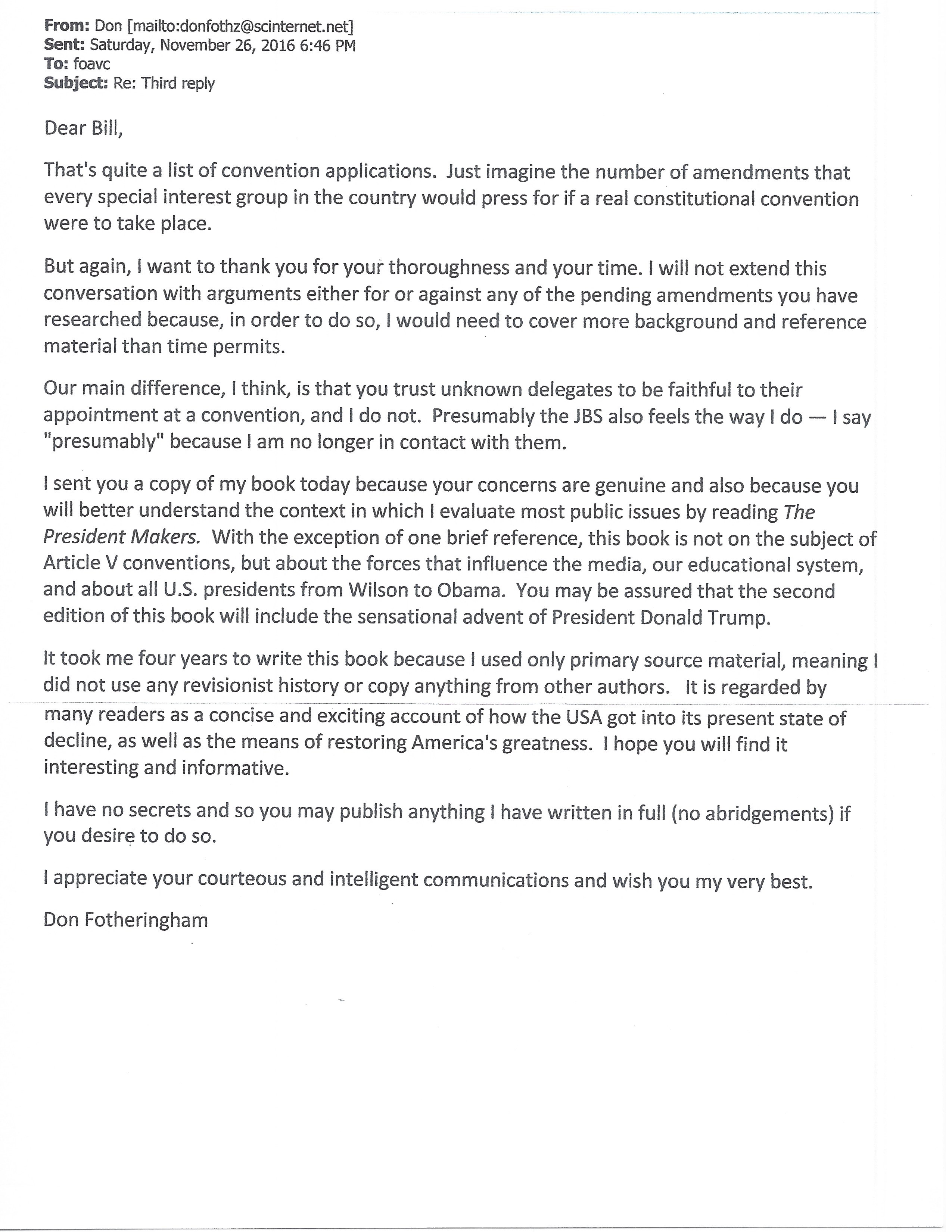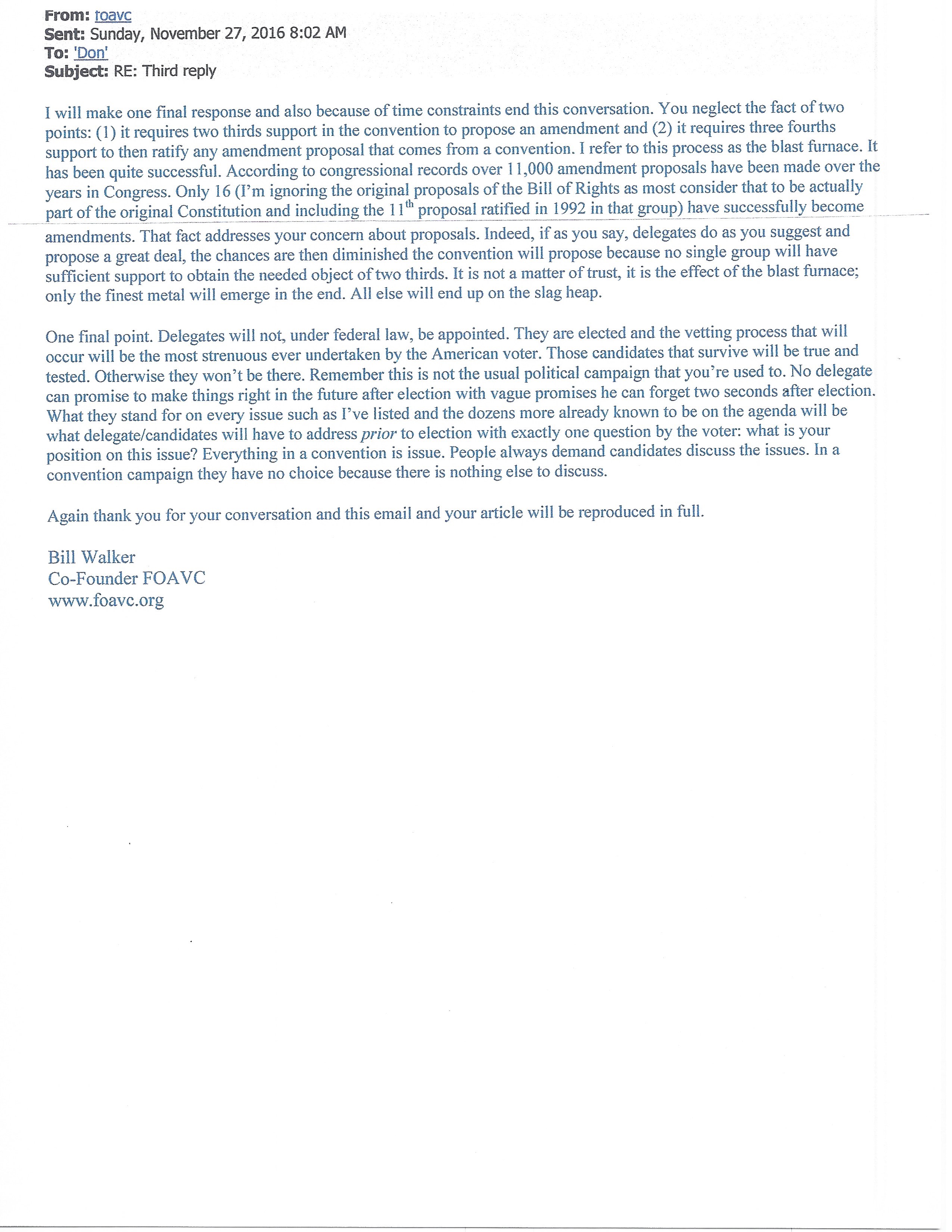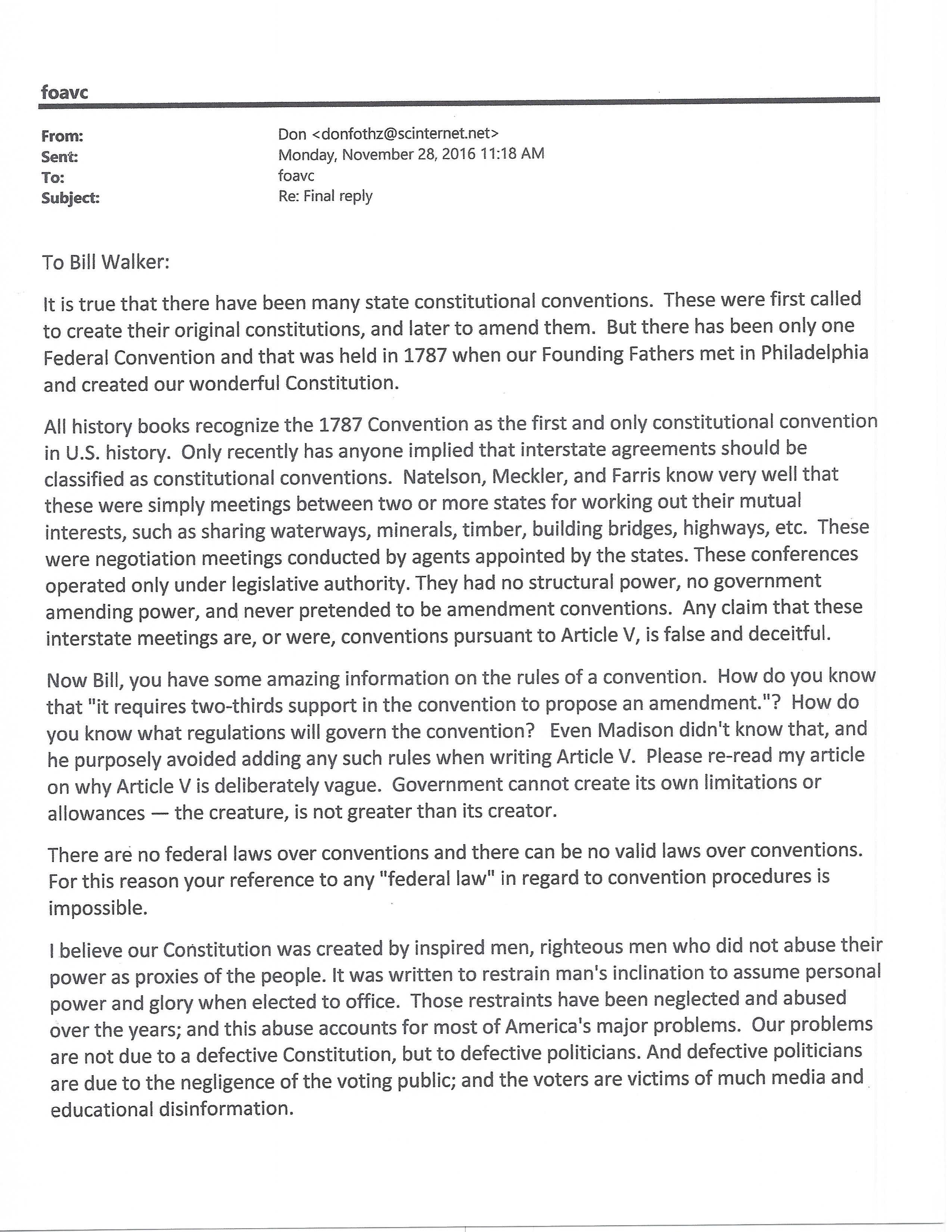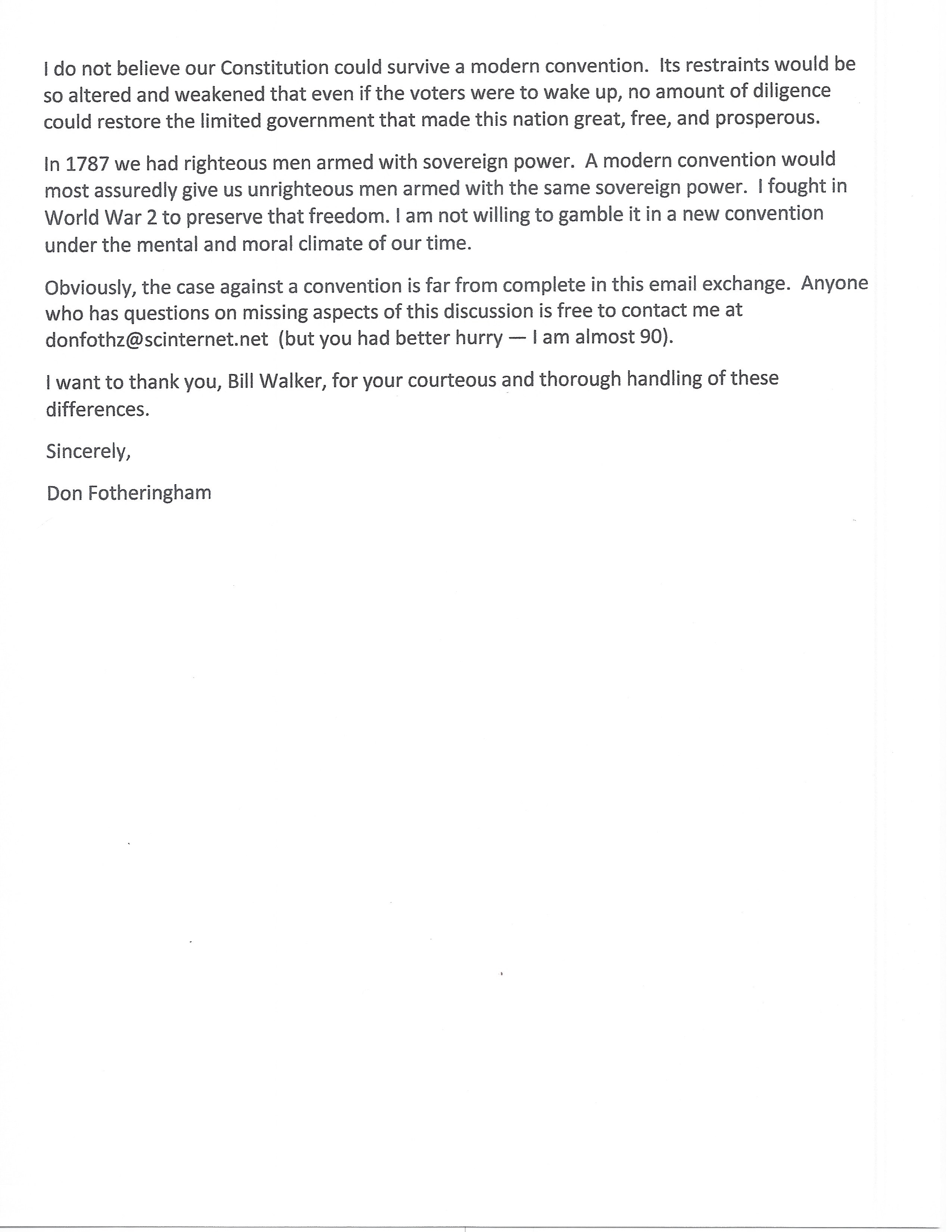
Subjects Inside: Article
V Applications
FAQ,
Application Counts By
Congress, Articles,
AVC Legislative Report, CRS Reports,
Convention of State, Compact for America, COS, CFA--Which States are Which?, The Historic Record of COS, COS, CFA Laws, COS Articles, CRS Reports on COS/CFA, COS, CFA Financial Records, CFA Financials, COS Financials, COS/CFA Financial Conclusions, John
Birch Society, Con-Con, Runaway
Convention, Who Called the Convention, Congressional
Vote on a "Runaway" Convention, "Obey
the Constitution, Only Two More States", Illegal Rescissions, The Phony Burger Letter, The
Madison Letter, Fotheringham Exchange, JBS Articles, Sibley
Lawsuit, General Interest, Article V.org,
Robert Natelson, History
of Article V, Counting the Applications, The Numeric Count History, Congressional Decision of May 5, 1789,
Development of Article V, The Committee of the Whole, The Committee of Detail, August 30, September 10, Committee of Style, September 15, Official Government Documents,
History of FOAVC, Founders,
Audio/Visual,
Links,
Contact
Us, Legal
Page, 14th Amendment, The Electoral Process, Packets,
Definitions,
Numeric, (
Applications grouped by numeric count as required by the Constitution),
Same Subject (Applications grouped by amendment subject, not required by the Constitution for a convention call).
Page
6 F--Continuing the Discussion of JBS/Eagle Forum

 On
April 9, 2010 the Phyllis Schlafly, founder of Eagle Forum, published an article on the
Eagle Forum website entitled "Good Advice Against a Con Con." (Click
images left to read column).
In the article Schlafly quoted from a letter written by James Madison to George Lee Turberville on
2 November
1788. The link in the Eagle Forum column leads to a site
entitled "Familytales.org." Schlafly alleged a
quote from the letter taken out of context proved James Madison was "warning on November 2, 1788
against calling another general constitutional convention" and this
warning equally applied to an Article V Convention.
On
April 9, 2010 the Phyllis Schlafly, founder of Eagle Forum, published an article on the
Eagle Forum website entitled "Good Advice Against a Con Con." (Click
images left to read column).
In the article Schlafly quoted from a letter written by James Madison to George Lee Turberville on
2 November
1788. The link in the Eagle Forum column leads to a site
entitled "Familytales.org." Schlafly alleged a
quote from the letter taken out of context proved James Madison was "warning on November 2, 1788
against calling another general constitutional convention" and this
warning equally applied to an Article V Convention.
Before discussing Schlafly's allegation
further it is important to recall JBS/Eagle Forum equate
the Federal Convention of 1787 convened under authority of the Articles
of Confederation (referred to by Schlafly as a "constitutional
convention" or "con con") and an Article V Convention convened under
authority of the Constitution as interchangeable. Schlafly states in
her column, "Madison's prophetic warnings against a general convention to amend our Constitution...are even more compelling today." [Emphasis added]. To JBS/Eagle Forum the two conventions are identical despite language of the Constitution limiting an
Article V Convention to only proposal of amendments to the present the
Constitution.
Under the terms of the Constitution an Article V
Convention cannot be
a "general constitutional convention." The purpose of the convention is
exactly specified, "a convention for proposing amendments" to the
present Constitution. As to Madison's "warning," while
Schlafly referred to Madison as the "Father of the U.S. Constitution,
she ignored the historic fact James Madison wrote the language of Article V at the Federal Convention of 1787 (See Page 11). Further Madison wholeheartedly supported an Article V Convention
as to affect and effect in the pivotal discussion about an Article V Convention in Congress on May 5, 1789 (See Page 11 C).
Prefacing her quote Schlafly wrote, "Speaking to us from
across the years, the Father of
the U.S. Constitution, James Madison wrote this warning on November 2,
1788 against calling another general constitutional convention.
[Schlafly then quoted the Madison letter]: "If a General
Convention were to take place for the avowed and sole purpose of
revising the Constitution, it would naturally consider itself as having
a greater latitude than the Congress appointed to administer and
support as well as to amend the system; it would consequently give
greater agitation to the public mind; and election into it would be
courted by the most violent partisans on both sides; it would probably
consist of the most heterogeneous characters; would be the very focus
of that flame which has already too much heated men of all parties;
would no doubt contain individuals of insidious views, who under the
mask of seeking alterations popular in some parts but inadmissible in
other parts of the Union might have a dangerous opportunity of sapping
the very foundations of the fabric.
Under all these circumstances it seems scarcely to be presumable that
the deliberations of the body could be conducted in harmony, or
terminate in the general good. Having witnessed the difficulties and
dangers experienced by the first Convention which assembled under every
propitious circumstance, I should tremble for the result of a Second,
meeting in the present temper of America, and under all the
disadvantages I have mentioned."
Schlafly then concluded, "Madison's
prophetic warnings against a general
convention to amend our Constitution (now colloquially called a Con
Con) are now even more compelling today."
This "prophetic warning" is frequently cited by
JBS/Eagle Forum as proof for not holding an Article V Convention
despite the fact the requirement mandating a convention under the
Constitution has been satisfied. (See 2010
JBS/Eagle Forum article).
As
the "warning" is contained in easily obtained historic record, a simple
examination reveals whether Schlafly was accurate as to
James Madison's "warning" against holding an Article V Convention today
or did she misrepresent Madison. Given
Madison's history of both writing Article V and his unabashed public
support for the convention clause in 1789 the question is: did Madison support
an Article V
Convention during
the Federal Convention of 1787 only to switch his position to "warning"
against an Article V Convention in late 1788 as Schlafly alleges only
to switch again to supporting the convention clause
seven months later in May, 1789?
 To
answer this question requires examination of the full text of the letters
(rather than taking a quote out of context as Schlafly did) from George
Lee Tuberville to Madison
leading up to Madison's response on 2 November 1788 as well as any
subsequent letters in which Tuberville responded to Madison's comments
of 2 November 1788. Copies of
these letters may be enlarged by clicking the on appropriate image.
[Tuberville letter of 20 October 1788 is shown at left. Tuberville
letter 24 October 1788 (panels 1-2); Tuberville letter 27[29]
October 1788 (panels 3-4). Madison letter
2 November 1788 (panels 5-6); Tuberville letter of 13 November 1788,
(panels 7-8). Tuberville letter 16 November 1788
letter (panels 9-10). Second Madison letter referred to 16 November
1788 Tuberville letter has never been found.
To
answer this question requires examination of the full text of the letters
(rather than taking a quote out of context as Schlafly did) from George
Lee Tuberville to Madison
leading up to Madison's response on 2 November 1788 as well as any
subsequent letters in which Tuberville responded to Madison's comments
of 2 November 1788. Copies of
these letters may be enlarged by clicking the on appropriate image.
[Tuberville letter of 20 October 1788 is shown at left. Tuberville
letter 24 October 1788 (panels 1-2); Tuberville letter 27[29]
October 1788 (panels 3-4). Madison letter
2 November 1788 (panels 5-6); Tuberville letter of 13 November 1788,
(panels 7-8). Tuberville letter 16 November 1788
letter (panels 9-10). Second Madison letter referred to 16 November
1788 Tuberville letter has never been found.
Schlafly's quote of Madison is accurate.
However the question is not whether Schlafly quoted Madison accurately
but whether she interpreted Madison's letter
accurately. Thus, was the substance of Madison's letter a "warning"
against an Article V Convention described in Article V of the Constitution or was he "warning" against some other convention?
The
historic facts are these: As of
November, 1788, eleven states had ratified the Constitution. This was
sufficient under the terms of the new Constitution to commence a new government (See Page
12, Table14). However politically the nation was in a state of flux, caught
between the establishment of a new government and termination of the old. Many did not support
the new Constitution (including Governor George Clinton presiding officer at the New York ratification convention (later Vice President under presidents Jefferson and Madison) (See Page 12, Table 14, New York Ratification, panels 9-10, 2nd row, panels 1-3, 3rd
row). One tactic employed to thwart the establishment of the
Constitution was to demand "amendments" to the new Constitution
(proposed by a second convention held prior to the new Constitution taking effect) while
the nation was still technically operating under the Articles of Confederation.
Ultimately these demands for amendment to the Constitution were
satisfied by Congress when it proposed what came to be known as the
Bill of Rights after the new Constitution became the law of the land. During late 1788 however despite
the fact Virginia had ratified the new Constitution on June 26, 1788,
(See Document: Page 12, Table 14, Virginia
Ratification)
fierce political battles still raged in Virginia regarding the
national government. Like Clinton many in Virginia believed amendments were needed to the new Constitution before the Constitution took effect.
Madison was in New York during the time of these letters. It required
six days for mail to travel between Virginia and New York. When
Madison responded to George Lee Tuberville on 2 November
1788 he was responding to the two Tuberville letters posted 20, 24
October 1788.
Madison did not change his
position regarding an Article V Convention on November 2, 1788. The
letters, when read in full, make it clear while an Article V Convention
was mentioned the "convention" being discussed in relation to the quote used by Schalfly was not the Article V
Convention clause contained in the Constitution. Rather the full
text of the
letters prove
irrefutably the subject of the discussion was the proposal by the state
of New York for a second "General Convention" to propose
amendments to the new Constitution before the new Constitution took legal effect.
(See: Page 12, Table 14, New
York Ratification).
Tuberville stated this emphatically in his 20 October 1788 letter
saying, "A proposition is talked of even by the staunchest friends to
the New Constitution, to close With N York & propose another
convention to amend--your opinion on this subject wou'd assist me Much,
especially if you think it improper--I therefore write for this
information which I shou'd be gratefully obliged for." Tuberville again
referred to the New York proposal in his 24 October 1788 letter saying,
"Much talk of closing with New York in her proposal for a new
convention. PrimÔ facie--I see no impropriety in it." Tuberville is
even more emphatic in his 27[29] October 1788 letter which quotes
resolutions before the Virginia state legislature.
The actual language of these resolutions contained in Tuberville's 27[29] October 1788 letter present a significant fact. Unlike the New York resolution which requested a convention be held before
the Constitution took effect, the Virginia resolution called for an
"Application be made to the Congress of the United states [sic]--so
soon as they shall Assemble under the new Constitution to call a
Convention for proposing Amendments to the same according to the mode
therein described. [Emphasis added]. The resolution was
defeated. However a subsequent resolution/application ultimately was
passed by the state legislature of Virginia. This application became
the basis for the May 5, 1789 discussion by Madison and other members
of Congress on the terms and conditions of an Article V Convention.
The
resolution referred by Tuberville in his letter therefore was a
resolution/application requesting a convention to be convened under the terms of the new Constitution using the convention clause described in Article V. In short the state of Virginia was considering a resolution in favor of an Article V Convention. It also obviously understood the Article V Convention was not the "General Convention" sought by the state of New York. Indeed the text of Tuberville letter of 27[29] October 1788 letter clearly
show the state legislature of Virginia understood the difference
between Clinton's proposed second convention held under the Articles of
Confederation prior to the Constitution taking effect and an Article V
Convention application to take effect after the Constitution took affect. As
the state legislature eventually applied for an Article V Convention
obviously it (and the other 48 states to follow) believed the
convention specified in Article V not to be a "danger" as Schlafly
states in her April 9, 2010 column.
As noted by Madison in his November letter he was referring to the
question poised by Tuberville in his letters of 20, 24 October 1788:
whether a second convention (to be convened before the Constitution took effect)
should be held. The text of Madison's letter (not quoted by Schlafly)
proves it was this subject Madison was discussing and not an Article V
Convention. Madison summed the basis for and purpose of his response
in the third sentence of his letter (ignored by Schlafly) saying, "You
wish to know my sentiments on the project of another general Convention
as suggested by New York."
As the Madison is clear as to his meaning and intent in his letter it is obvious Schlafly deliberately ignored whatever text disproved
her contrived "warning" about an Article V Convention by Madison.
Madison listed four points in his letter discussing the question of a
second convention being held prior to the Constitution taking effect.
Schlafly, quoting out of context, ignored three of the points and
quoting only one point made by Madison in his letter and
never mentioning that Madison's reference to a "General Convention" did
not refer to an Article V Convention but a different convention entirely. Madison's points in his letter were:
1. He agreed amendments
to the new Constitution were needed and "wished it [the Constitution]
to have received before it issued from the place [the Federal
Convention of 1787] in which it was formed."
2. Madison raised the question of "which of the two modes provided [in
the Constitution, by Congress or convention] be most eligible for the
discussion and adoption of them [proposed amendments]."
3. Madison then stated support for Congress rather than a convention
proposing the needed amendments. "The objections agst. a Convention
which give a preference to the other mode in my judgment are the
following." Madison listed the reasons for his preference in using
Congress rather than a convention to propose the needed amendments to
the new Constitution:
- It would "add to the difference among the States
"on the merits, another and an unnecessary difference concerning the
mode." Madison foresaw a "number of States who will be so averse
and apprehensive as to the mode, that they will reject the merits
rather than agree to the mode." He concluded, "A convention therefore
does not appear to be the most convenient or probable channel for
getting to the object."
- Madison discussed difficulties of calling the
convention noting "A convention cannot be called without the unanimous
consent of the parties who are to be bound by it, if first principles
[Articles of Confederation] are to be recurred to; or without the
previous application of 2/3 of the State legislatures, if the forms of
the Constitution are to be pursued." Madison then stated, "The
difficulties in either of these cases must evidently be much greater
than will attend the origination of amendments in Congress, which may
be done at the instance of a single State Legislature, or even without
a single instruction on the subject."
- Madison's third point was quoted by Schlafly.
However it must be remembered Madison already stated the purpose of his
letter was to discuss "the project of another general Convention as
suggested by New York." Previously (as ignored by Schlafly) Madison had
been discussing the mode of amendment proposal by Congress versus by
convention as described in Article V of the Constitution. Now Madison
discussed the actual subject of the letter: "A General Convention
[proposed by New York] ... for the avowed and sole purpose of revising
the Constitution." Schlafly correctly states Madison opposed such a
convention but failed to point out in her article Madison described two distinct conventions in his letter--the
Article V Convention described in the Constitution (points 1 and 2) and
the "General Convention" not described in either the Articles of
Confederation or the Constitution (point 3).
- Finally Madison made a fourth point
(also ignored by Schlafly) which clearly proves Madison was discussing
events of 1788 and not warning against an Article V Convention and its
purported "dangers" in the future as Schlafly alleges. Madison stated,
"It is not unworthy of consideration that the prospect of a second
Convention would be viewed by all Europe as a dark and threatening
Cloud having over the Constitution just established
[emphasis added]. Madison then discusses the effect of the new
Constitution on Europe, particularly France which, a few years later,
would have its own revolution partly based on the experience in America
["its influence is already secretly but powerfully working in favor of
liberty in France..."]. Madison then addresses a recent loan from
Holland "that alone saved the U.S. from Bankruptcy...and that loan was
obtained from a belief that the Constitution then depending wd. be
certainly speedily, quietly, and finally established, & by that
means put America into a permanent capacity to discharge with honor
& punctuality all her engagements."
In sum all references in Madison's 2 November 1788 letter describe present day events of 1788. There are no references to speculative events in the future. Madison certainly does not "warn" against an Article V Convention except for
political purposes of the day he believed the most expedient course to
propose
amendments to the new Constitution was by means of Congress rather than
by convention. He carefully described the reasons for this belief in
his letter.
Schlafly carefully avoided any reference to Madison's
letter which reflected this fact or the fact Madison discussed two distinct conventions--an
Article V Convention and a "General Convention." The two conventions
were for two distinct purposes--the first to propose amendments to the
Constitution once it took effect; the second to propose amendments to
the new constitution prior to it taking effect.
Schlafly avoided any reference to the fact Madison did not favor using an Article V Convention for current political reasons as he believed the congressional mode of amendment proposal to be more "convenient." At no time did
Madison "warn" against using an Article V Convention in the future.
Thus Madison did not switch his position on an Article V Convention.
The public record proves Phyllis Schlafly deliberately misrepresented
Madison by taking his words out of context from the letter he
wrote on 2 November 1788.
The Fotheringham Exchange
On November 23, 2016,
Don Fotheringham published an article entitled
"Article V is Deliberately Vague" on the News With Views website.
According to his biography at the end of his article Mr. Fotheringham
was in charge of the anti-convention campaign by JBS beginning in 1983
and remained in charge of the campaign until his retirement from JBS in
2012.
Bill Walker, co-founder of FOAVC sent an email in
response to the column written by Mr. Fotheringham. What followed was an exchange of
emails in which Mr. Fotheringham made several revelations regarding the
JBS anti-convention campaign which he helped to create.
Most
particular is the revelation the question of whether so-called
"rescissions"
having any legal affect was never considered by JBS nor the question of
legality was discussed with any member of a state legislature during
the
40 year JBS campaign. FOAVC believes the revelations and exchange by
Mr. Fotheringham to be significant. The original article by Mr.
Fotheringham column and subsequent
email exchange is published below in sequential order. Images may be
clicked
to enlarge.
Summation
JBS/Eagle Forum has
spent over 40 years campaigning against an Article
V Convention. FOAVC has presented the primary arguments used by these
organizations as the basis for their opposition to Congress calling an
Article V Convention as required by the United States Constitution. The
public record of state applications is irrefutable: the states have
applied in sufficient numbers to cause Congress to call several conventions.
The opposition of JBS/Eagle Forum is clearly intended to enable
Congress outright disobey
the Constitution despite statements by JBS/Eagle Forum should obey the Constitution. Veto
of the Constitution by Congress
is a serious alteration of the structure of our
form of government an is an act of insurrection. Arguments for such a massive undertaking must be
sound and true to support such a decisive change in government.
FOAVC has compared each JBS/Eagle Forum argument in the
light of related public record. In each instance, the
public record proved the argument false. This public
record is easily obtainable. It is impossible to believe JBS/Eagle
Forum either was unaware of the public record or was unable to obtain
it for their use. The only conclusion is the public record was
deliberately ignored by JBS/Eagle Forum or deliberately falsified to advance
their political agenda.
The public record proves Congress is required
to call an Article V Convention. Congress has not done so primarily
because of the false statements by JBS/Eagle Forum.
Such continued action is not only foolhardy but dangerous. A belief by
the Government it can veto the Constitution will wreck catastrophic
havoc in this nation. The
JBS/Eagle Forum arguments are neither sound nor true. Therefore
JBS/Eagle Forum arguments for why an Article V Convention should not be called
must be
disregarded.
Page Last Updated: 9-APRIL 2017

 On
April 9, 2010 the Phyllis Schlafly, founder of Eagle Forum, published an article on the
Eagle Forum website entitled "Good Advice Against a Con Con." (Click
images left to read column).
In the article Schlafly quoted from a letter written by James Madison to George Lee Turberville on
2 November
1788. The link in the Eagle Forum column leads to a site
entitled "Familytales.org." Schlafly alleged a
quote from the letter taken out of context proved James Madison was "warning on November 2, 1788
against calling another general constitutional convention" and this
warning equally applied to an Article V Convention.
On
April 9, 2010 the Phyllis Schlafly, founder of Eagle Forum, published an article on the
Eagle Forum website entitled "Good Advice Against a Con Con." (Click
images left to read column).
In the article Schlafly quoted from a letter written by James Madison to George Lee Turberville on
2 November
1788. The link in the Eagle Forum column leads to a site
entitled "Familytales.org." Schlafly alleged a
quote from the letter taken out of context proved James Madison was "warning on November 2, 1788
against calling another general constitutional convention" and this
warning equally applied to an Article V Convention.











